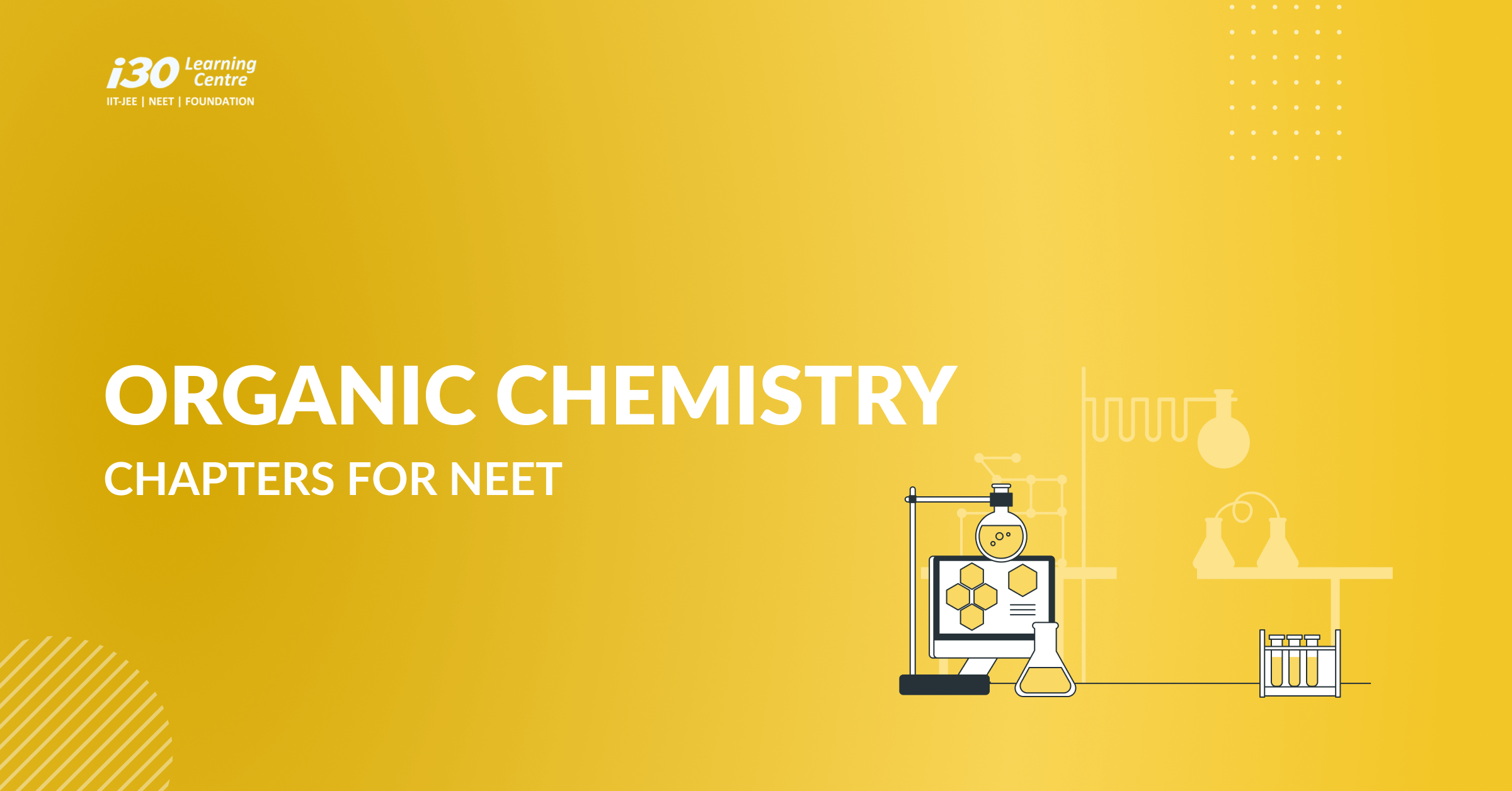NEET is a National Level Examination with a large number of participants who strive to pass the exam. There is fierce competition because it is a PAN India-level examination. Since many students aspire to clear the NEET examination to get admission to their preferred medical college. So, the aspirants must prepare patiently, consistently, and with perseverance for all subjects in the NEET syllabus.
To achieve the results, students need to make sure they have a clear understanding of two important things
- Topics and chapters in the given syllabus
- Weightage of the topics and chapters in the syllabus.
When you know and understand the syllabus and chapter-wise weightage, you will be able to devise and implement a successful NEET preparation strategy. NEET is entirely based on science subjects (physics, chemistry, biology) and has 180 questions.
However, chemistry is one of the scoring subjects in the NEET; it contains 25% weightage and includes class portions for classes 11 and 12 Organic chemistry is the most important section in chemistry. To learn more about organic chemistry chapters for NEET, please read the article below.
How Many Chapters Are in Organic Chemistry for Neet?
NEET consists of 180 questions with a total of 720 marks. The chemistry section has 45 questions with 3 sub-sections in the examination, i.e. organic, inorganic, and physical. Three sub-sections are equally crucial to scoring well on NEET.
Chemistry consists of 30 major chapters, including class 11 and class 12. Organic chemistry has 11 chapters, similar to the number of chapters in physical chemistry on the NEET syllabus.
The following table breaks down the chapters into three Chemistry sub-sections:
| Organic Chemistry | Physical Chemistry | Inorganic Chemistry |
| General Organic Chemistry | Solid State | Hydrogen |
| Biomolecules | Atomic Structure & Nuclear Chemistry | Chemical Bonding |
| Chemistry in Everyday Life | Chemistry Equilibrium | Periodic Table |
| Hydrocarbons | Surface Chemistry | Periodicity in Properties |
| Polymer | Electrochemistry | P-Block Elements |
| Environmental Chemistry | Ionic Equilibrium | S-Block Elements |
| Haloalkane | Gaseous State | Coordination Compounds |
| Aldehydes, Ketones and Carboxylic Acids | Redox Reactions | Metallurgy |
| Alkyl Halide, Alcohol & Ether | Mole Concept | D- block Elements |
| Practical Organic Chemistry | Chemical Kinetics | F – Block Elements |
| Aromatic Compounds | Thermodynamics | Qualitative Analysis |
| Organic Compounds Containing Nitrogen | Thermochemistry | |
| IUPAC and Isomerism | Solution & Colligative Properties |
Which Chapters Are Included in Organic Chemistry?
The chemistry section has been divided into 3 sub-sections: Physical, Inorganic, and organic. These are the chapters included in organic chemistry, please find them below:
- General Organic Chemistry – Basic Principles and techniques
- Chemistry in Everyday Life
- Environmental Chemistry
- Carbonyl Compounds
- Practical Organic Chemistry
- Biomolecules
- Haloalkane
- IUPAC & Isomerism
- Hydrocarbons
- Aromatic Compounds
- Polymer
- Aldehydes, Ketones, and Carboxylic Acids
- Alkyl Halide and Alcohol & Ether
- Organic Compounds Containing Nitrogen
Is Organic Chemistry Hard for Neet?
Some candidates find organic chemistry a difficult section in chemistry. They ignore the section for fear of scoring fewer marks. On the contrary, some students find it to be the easiest and most scoring section. It depends on the candidate’s knowledge and interest. If you like the subject, you will find it easy.
Each subject and section have its own level of standards. It is not hard to predict the level of organic chemistry for the upcoming NEET examination. According to the previous analyses, it has been noticed that in NEET organic chemistry, the difficulty lies between moderate and easy.
Organic chemistry is moderately difficult but not difficult on the NEET. What you need to do is just concentrate on comprehending basic chemistry concepts and ideas.
Here are some tips to prepare for NEET organic chemistry:
- Begin from the fundamental chemistry.
- Prepare a strategy & follow it.
- Practice regularly.
- Analyse Previous Question papers.
- Make notes and not just memorize.
- Do mock tests.
- Prepare reactions by writing them.
- Understand the mechanism behind reactions and products.
- Keep a separate notebook for named and unnamed reactions.
- Keep on practicing every day.
While preparing for NEET, you should refer to books that can help you master the subject. Below mentioned are some of the important books for organic chemistry:
- NCERT Books
- General Organic chemistry – Basic principles and techniques
- Organic chemistry – Morrison
- Organic chemistry- OP Tandon
- ABC of Chemistry Book – 11th and 12th Classes
Can I Complete Organic Chemistry in 3 Months?
Organic chemistry is one of the most important sections in the NEET. Most of the students find it difficult to understand and prepare. However, candidates can complete organic chemistry in 3 months. We will explain how to prepare for organic chemistry and achieve high NEET scores.
Here are some pointers to help you prepare for Organic Chemistry:
- Begin from the basics → NCERT Chemistry Class 11 and Class 12 books are important for preparation. Ensure you understand all topics clearly before referring to other materials.
- Prepare a strategy → Prepare a pragmatic strategy for preparation.
- Understand the syllabus and chapter-wise weightage.
- Focus on understanding concepts clearly from the basic.
- Practice reactions every day.
- Concentrate more on chapters with high weightage
- Do mock tests and check progress every day.
If you follow the tips above, you will be able to understand and predict the questions and their patterns.
Note: For NEET coaching check this website https://ischolar.live/, it will help and guide you in preparation for the NEET.
What Chapters Should I Study before Organic Chemistry?
Many students have difficulty determining the order in which chapters should be read and where to begin. The list below will assist you to identify the chapters you need to study before taking organic chemistry.
- General Organic Chemistry: Basic Techniques and Concepts
- Chemistry in Everyday life
- Chemical Bonding
- Periodic Table
- Biomolecules
- Environmental chemistry
- Surface chemistry
- Isomerism and IUPAC.
Note: To Prepare for organic chemistry, you must use NCERT books.
How Many Marks for Organic Chemistry in Neet?
The chemistry section of the NEET exam has 45 questions in total, carrying 180 marks. There are three sub-sections of chemistry for the NEET examination: Organic chemistry, Inorganic chemistry, and Physical chemistry.
We have provided chapter-wise questions and marks from organic chemistry as per the given weightage to the organic chemistry section. Please find the table below:
| Chapter Name in Organic chemistry | Average number of questions from the chapter | Marks weightage (In percentage) |
| General Organic Chemistry | 2 | 5 |
| Chemistry in Everyday life | 2 | 3 |
| Biomolecules | 2 | 4 |
| Hydrocarbons | 2 | 4 |
| Practical Organic Chemistry | 1 | 2 |
| Environmental Chemistry | 1 | 2 |
| Aromatic compounds | 3 | 6 |
| Aldehydes, Ketones and Carboxylic Acids | 2 | 3 |
| IUPAC & Isomerism | 2 | 4 |
| Polymer & Haloalkane | 2 | 4 |
Please note that this data was noticed from the previous year and may vary this year.
FAQ: Organic Chemistry Chapters for NEET
1. How many chapters/topics are in Organic Chemistry?
The NEET chemistry syllabus covers 30 main chapters, including those from class 11 and 12. Organic chemistry has 11 chapters, while physical and inorganic chemistry each have a similar number of chapters.
2. Which chapters in NEET chemistry are considered easy to score marks?
Some students may consider the following chapters to be easier to score marks:
- Chemistry in Everyday life
- Biomolecules
- Polymers
- Surface chemistry
- General Organic chemistry
3. What are the sub-sections in NEET chemistry?
Chemistry has been divided into 3 sub-sections in the subject.
- Physical chemistry
- Organic chemistry
- Inorganic chemistry
4. Are NCERT chemistry books enough to prepare for NEET?
Yes, NCERT books are highly recommended for NEET preparation. They will help you to get a basic understanding of concepts and build the foundation of the subject.
Conclusion
Chemistry is quite a broad subject, and organic chemistry is one of the major concepts in that subject. Many students consider organic chemistry to be a difficult subject, but this is not the case if you understand concepts and practice patiently and diligently. To achieve high marks in the organic chemistry section, students must devote sufficient time to prepare.
We hope this article will help you with your search for Organic Chemistry chapters for NEET. If you have any questions, please leave them in the comments section.



